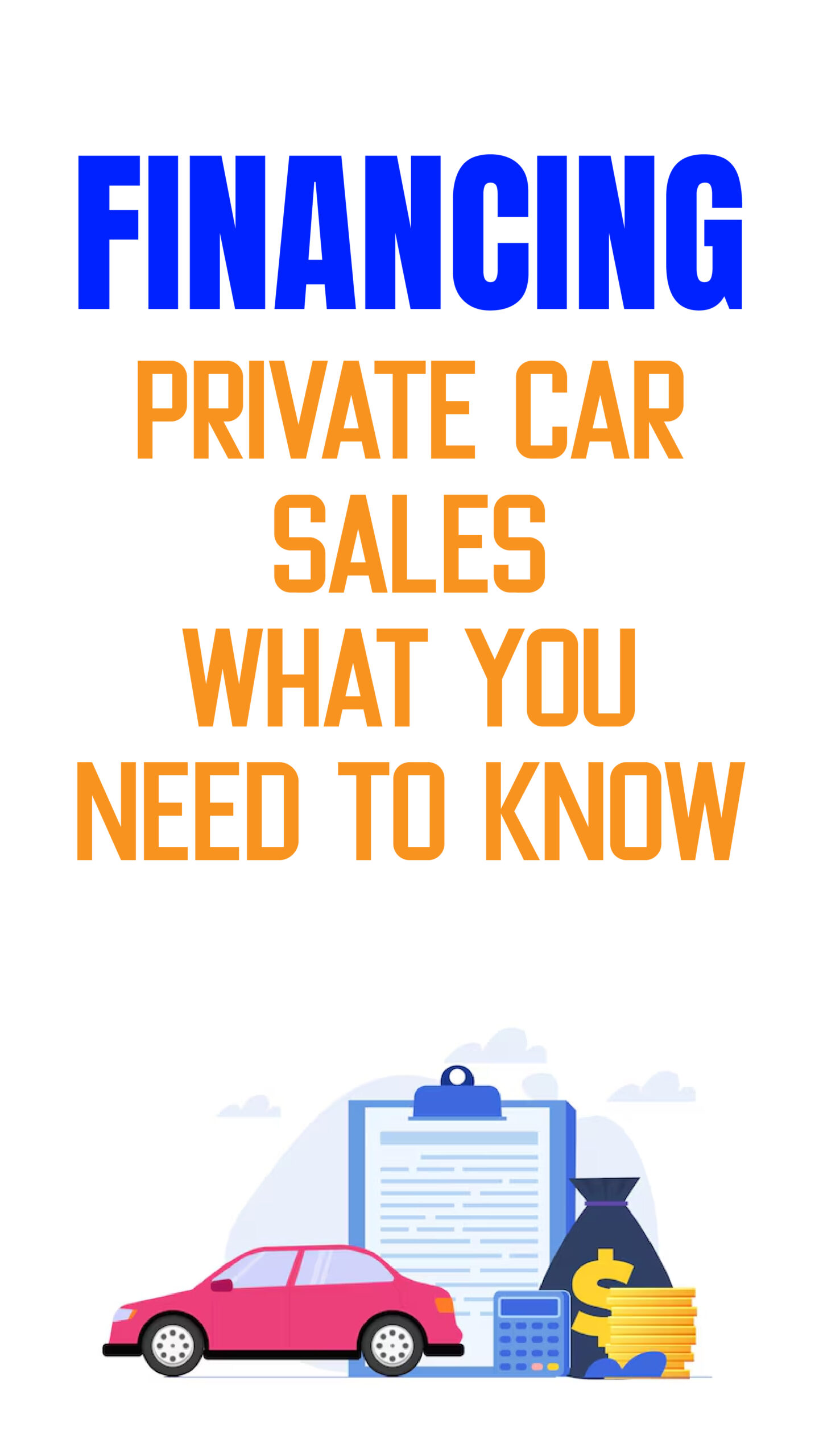Yes, you can finance a car from a private seller. Many lenders offer loans specifically for private party purchases.
Financing a car from a private seller can be a practical option. It often provides more flexibility and potentially better deals than dealerships. While the process is slightly different from buying from a dealer, it is straightforward. First, secure a loan from a bank, credit union, or online lender.
Ensure you have a clear title and a bill of sale. Verify the vehicle’s history and condition. This diligence ensures you get a reliable car and a fair deal. Financing a private sale can be a smooth, cost-effective way to buy a car, provided all steps are correctly followed.
Introduction To Private Car Seller Financing
Buying a car from a private seller can be exciting. It often means better deals than dealerships. But, can you finance a car from a private seller? Let’s explore this.
What Is Private Car Seller Financing?
Private car seller financing involves getting a loan for a car bought from a private individual. Unlike dealership financing, it requires different steps. Banks and credit unions often provide these loans.
Here’s a simple breakdown:
- Find a private seller with a car you like.
- Apply for a loan through a bank or credit union.
- Get the car inspected and appraised.
- Complete the paperwork and finalize the loan.
Importance Of Financing Private Car Sales
Financing private car sales is crucial for several reasons:
| Reason | Explanation |
|---|---|
| Affordability | Loans make cars more affordable. You don’t need to pay all upfront. |
| Better Deals | Private sellers often offer lower prices than dealerships. |
| More Choices | Financing gives you access to a wider range of cars. |
Financing from private sellers can be a smart move. It opens more opportunities and saves money.
Benefits Of Financing A Private Car Purchase
Financing a private car purchase can offer several advantages. This method can be beneficial for buyers in various ways. Below are some key benefits of financing a car from a private seller.
Lower Interest Rates
Private car financing often comes with lower interest rates. These rates can be lower than those offered by dealerships. Banks and credit unions may provide better terms. This can save you money over the loan term.
Flexible Repayment Terms
Financing through private sellers offers flexible repayment terms. You can often choose the length of your loan. This flexibility allows you to manage your budget more effectively.
| Benefit | Description |
|---|---|
| Lower Interest Rates | Save money with lower interest rates. |
| Flexible Repayment Terms | Choose a loan term that fits your budget. |
- Lower interest rates mean you pay less overall.
- Flexible repayment terms help manage your finances.
Types Of Financing Options
Buying a car from a private seller can save you money. But, finding the right financing can be tricky. Let’s explore the different options you have.
Bank Loans
Banks offer loans specifically for car purchases. Bank loans often have competitive interest rates. You will need a good credit score to qualify. Banks may also require detailed information about the car.
| Bank Loan Pros | Bank Loan Cons |
|---|---|
| Lower interest rates | Requires good credit score |
| Structured repayment plans | More paperwork |
Credit Unions
Credit unions are member-owned and not-for-profit. They often provide lower interest rates and flexible terms. You may need to be a member to get a loan. Membership usually comes with extra benefits.
- Lower interest rates
- Flexible repayment terms
- Membership benefits
Personal Loans
Personal loans are another option. Personal loans are not tied to the car itself. This means more flexibility. But, they usually have higher interest rates. You can use personal loans for various expenses, not just for buying a car.
- Flexible use of funds
- No collateral required
- Higher interest rates

Credit: www.creditkarma.com
Steps To Secure Financing
Buying a car from a private seller can be a smart choice. Securing financing for it involves a few important steps. This guide will help you navigate through the process smoothly.
Pre-approval Process
Start by getting pre-approved for a car loan. This shows sellers you are serious. Visit a bank or credit union for pre-approval. They will check your credit score and financial history.
- Visit your bank or credit union.
- Request a pre-approval application.
- Provide your credit score and financial details.
Gathering Required Documents
Next, gather all required documents. This ensures a smooth loan process. Here is a list of what you need:
| Document | Description |
|---|---|
| Proof of Income | Recent pay stubs or tax returns. |
| Proof of Identity | Driver’s license or passport. |
| Vehicle Information | Details about the car from the seller. |
| Insurance Proof | Current auto insurance details. |
Finalizing The Loan
Once approved, move to finalizing the loan. Ensure all paperwork is in order. Follow these steps:
- Review the loan terms carefully.
- Sign the loan agreement.
- Ensure the seller has transferred the car title.
- Submit all documents to your lender.
After completing these steps, you will receive your funds. You can then pay the private seller and enjoy your new car!
Evaluating The Car’s Value
Buying a car from a private seller can be tricky. Knowing the car’s value is crucial. This ensures you don’t overpay. Let’s explore the ways to evaluate a car’s value.
Using Online Valuation Tools
Online valuation tools are simple to use. These tools help you get an accurate estimate. Some popular tools include:
- Kelley Blue Book
- Edmunds
- NADA Guides
Enter the car’s details. This includes the make, model, year, and condition. The tool will then give you an estimated value. This value is based on market data.
Compare results from multiple tools. This ensures you get a fair estimate. Always use these tools before making an offer.
Getting A Professional Appraisal
A professional appraisal provides a detailed car value. Certified appraisers inspect the car thoroughly. They check the car’s condition, mileage, and history.
Here are steps to get a professional appraisal:
- Find a certified appraiser in your area.
- Schedule an appointment for the inspection.
- Receive a detailed report with the car’s value.
Professional appraisals are very accurate. They are worth the investment. They help you make an informed decision.
Use both methods to evaluate the car’s value. Online tools give a quick estimate. Professional appraisals provide detailed insights. Together, they ensure you pay the right price.

Credit: www.linkedin.com
Legal And Paperwork Considerations
Financing a car from a private seller can be tricky. You need to handle legal and paperwork considerations. This ensures a smooth and legal transaction. Below are key areas to focus on.
Title Transfer
The title transfer is crucial in a car sale. It shows who owns the car. Both the buyer and seller must sign the title. The buyer then registers the car in their name. Make sure all details on the title are correct. Any errors can cause delays.
Bill Of Sale
The Bill of Sale is a legal document. It proves the sale of the car. This document should include:
- Names and addresses of buyer and seller
- Car make, model, year, and VIN
- Sale price and date of sale
- Odometer reading at the time of sale
Both parties should keep a copy of the Bill of Sale. This protects against future disputes.
Lienholder Information
If the car has a lien, it means the seller owes money on it. The lienholder information must be clear. The lien must be cleared before the title can be transferred. This may involve:
- Contacting the lienholder for a payoff amount
- Paying off the lien
- Getting a lien release document
Make sure the lien release is submitted with the title transfer paperwork.
Understanding these legal and paperwork considerations is key. It ensures your car purchase is valid and hassle-free.
Tips For A Smooth Transaction
Buying a car from a private seller can be a great deal. But it needs careful planning. Follow these tips for a smooth transaction.
Inspecting The Car
Always inspect the car before buying. Check the car’s exterior for dents and scratches. Look at the tires and make sure they are in good condition. Open the hood and check the engine. Look for any signs of leaks or rust. Take the car for a test drive. Listen for any strange noises. Make sure the brakes work well.
Negotiating The Price
Once you inspect the car, you can talk about the price. Start with a lower offer than the asking price. Be polite but firm. Use the car’s condition to justify your offer. If the car has issues, mention them. This can help lower the price. Be ready to walk away if the price is too high. Sometimes, sellers will lower the price if they see you are serious.
Avoiding Common Scams
Be aware of common scams when buying a car. Check the car’s history report. Make sure the VIN on the car matches the report. Do not pay in cash. Use a cashier’s check or bank transfer. Meet in a public place to complete the transaction. If the deal seems too good to be true, it probably is. Trust your instincts and stay safe.

Credit: www.autocreditexpress.com
Potential Challenges
Financing a car from a private seller presents unique challenges. These hurdles can impact both buyer and seller. Understanding these potential issues is crucial for a smooth transaction.
Credit Score Requirements
Lenders often have strict credit score requirements for private car sales. They may demand higher scores than dealerships. This ensures the buyer is financially reliable. If your score is low, securing a loan might be difficult. Improving your credit score before applying can help.
Interest Rate Variability
The interest rates for private sales can vary widely. Lenders view these loans as riskier. This leads to higher interest rates. Comparing rates from multiple lenders is essential. This ensures you get the best deal. A small difference in rates can save you money over time.
Vehicle Condition Risks
Private sellers may not disclose all vehicle condition issues. This can lead to unexpected repair costs. It’s important to get the car inspected by a professional. An inspection can reveal hidden problems. Knowing the car’s condition helps negotiate a fair price.
Below is a table summarizing these challenges:
| Challenge | Description | Solution |
|---|---|---|
| Credit Score Requirements | Higher score needed for private sales | Improve your credit score before applying |
| Interest Rate Variability | Rates can be higher and vary widely | Compare rates from multiple lenders |
| Vehicle Condition Risks | Potential undisclosed issues | Get a professional inspection |

Frequently Asked Questions
Can I Use A Personal Loan To Buy A Car?
Yes, you can use a personal loan to buy a car. Personal loans offer flexibility and can cover the car’s cost.
What Is Chase’s Current Auto Loan Rate?
Chase’s current auto loan rates vary. Rates start as low as 4. 19% APR for qualified applicants. Check their website for updates.
Can You Finance A Car From A Private Seller?
Yes, you can finance a car from a private seller. Many banks, credit unions, and online lenders offer loans for private car sales. Ensure you have all necessary documentation.
What Are The Steps To Finance A Private Car?
First, get pre-approved for a loan. Then, verify the car’s value and condition. Finally, complete the necessary paperwork with your lender.
Conclusion
Financing a private car purchase is possible and can be straightforward with the right steps. Research lenders, compare rates, and understand the terms. Always ensure the car is in good condition. This approach can help you secure a reliable vehicle while managing your finances effectively.
Happy car hunting!

